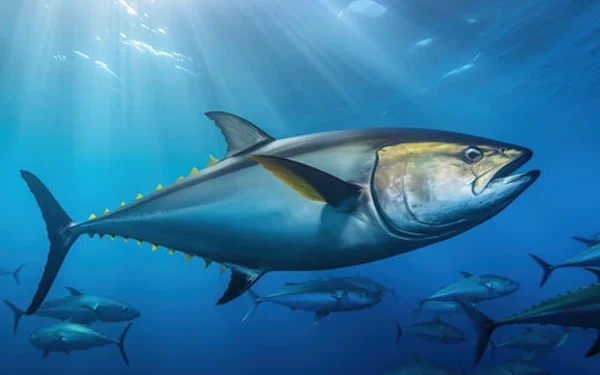ISLAMABAD : In a significant step toward revitalizing the fisheries sector, Pakistan is poised to earn up to $200 million in revenue from tuna exports over the next few years, following a strategic reform package announced by the federal government. The new direction includes sustainable fishing practices, international quota acquisition, infrastructure development, and value-added processing, setting the stage for Pakistan to become a key player in the global tuna trade.
🎣 Strategic Tuna Quota Secured from Indian Ocean Tuna Commission (IOTC)
Federal Minister for Maritime Affairs Junaid Anwar Chaudhry revealed that Pakistan has secured a 25,000 metric ton tuna quota from the Indian Ocean Tuna Commission (IOTC)—a major breakthrough for the country’s fishing industry. This quota includes:
- 15,000 tons of yellowfin tuna
- 10,000 tons of skipjack tuna
These species are among the most commercially valuable varieties of tuna in the global seafood market. The allocation was made under internationally recognized standards promoting sustainable fishing practices and marine biodiversity conservation.
“This is a milestone achievement for Pakistan’s tuna sector,” said the minister during a press briefing in Islamabad. “The global demand for tuna is rising, and with proper regulatory reforms, Pakistan can capitalize on this opportunity.”
🌍 Tuna: A High-Value Commodity in Global Markets
Tuna is one of the most sought-after seafood products globally, particularly in regions such as:
- Europe
- Japan
- North America
- Middle East
The international market price of tuna currently ranges between $5 to $7 per kilogram, and this could rise further through value-added processing, such as canning, freezing, and premium-grade cuts for sushi and sashimi markets.
Although Pakistan catches over 45,000 metric tons of tuna annually, much of this potential has gone untapped due to poor infrastructure, lack of traceability, weak regulation, and outdated fishing methods. The new quota system aims to align national practices with international standards, thereby improving both quality and revenue.
📜 National Fisheries and Aquaculture Policy: The Turning Point
Pakistan’s momentum in the tuna sector is driven by the implementation of the National Fisheries and Aquaculture Policy (NFAP). This policy harmonizes previously fragmented regulations, promotes environmentally friendly fishing techniques, and aligns the sector with Pakistan’s climate and marine conservation commitments under global frameworks such as:
- The United Nations Sustainable Development Goals (SDGs)
- The Convention on Biological Diversity
- The Paris Agreement
Through the NFAP, Pakistan is systematically shifting away from destructive fishing practices like gill netting and bottom trawling, which have long caused overfishing and environmental degradation in the Arabian Sea.
🔄 Transition to Sustainable Fishing: Longlining Replaces Gill Nets
A cornerstone of the new fisheries reform is the promotion of longlining, a selective and sustainable method of catching tuna that reduces bycatch—the unintended capture of non-target species such as dolphins, turtles, and juvenile fish.
In partnership with the United Nations Food and Agriculture Organization (FAO), Pakistan’s government has distributed 10 longline fishing kits to local fishermen free of cost. This initiative will help replace outdated practices and open doors to premium markets that require proof of sustainable harvesting.
“With longlining, we reduce the environmental damage and increase the quality and price of our catch,” said Minister Chaudhry. “This can push the value of tuna up from $2 to $8 per kilogram, a fourfold increase.”
📈 Revenue Enhancement through Policy and Certification Reform
To support the fisheries sector financially, the Ministry of Maritime Affairs has amended certification and testing fees, a move that is expected to significantly boost government revenues from Rs. 48 million to Rs. 250 million annually.
Certification, traceability, and lab testing are mandatory requirements for accessing high-end seafood markets like the European Union, which has strict quality control standards for imports. By streamlining the process and offering better infrastructure, Pakistan can now meet these demands more effectively.
🏗️ Infrastructure Development: Upgrading the Korangi Fisheries Harbor
To further accelerate tuna exports, the government is rehabilitating Karachi’s Korangi Fisheries Harbor, one of the largest fish harbors in South Asia. The upgraded facility will include:
- Modern cold storage and freezing facilities
- Quality control labs for international certification
- Export terminals for the EU, GCC, and East Asian markets
- Designated longline vessel docking areas
This investment is expected to facilitate direct exports to countries like Spain, Italy, Japan, and the UAE, improving market access and reducing dependency on middlemen.
🌐 Pakistan Strengthens Global Position in Fisheries Governance
In another major development, a Pakistani official has been elected Chairman of the IOTC Standing Committee on Administration and Finance for the first time in history. This enhances Pakistan’s voice and influence in international decision-making related to tuna fisheries and ocean governance.
This development is expected to:
- Strengthen Pakistan’s lobbying for fairer tuna quotas
- Improve access to technical and financial assistance
- Promote regional cooperation in the Indian Ocean zone
🤝 Empowering Local Fishermen and Coastal Communities
The fisheries reforms are not only about global trade; they also aim to uplift the socio-economic conditions of coastal communities in Gwadar, Karachi, Ormara, Pasni, and other major fishing hubs.
By providing:
- Training programs on sustainable fishing
- Access to modern fishing gear and boats
- Microcredit and subsidies for vessel upgrades
- Healthcare and social security benefits for fishermen
The government is hoping to empower over 150,000 individuals directly involved in Pakistan’s marine fisheries.
🔍 Challenges Ahead: Sustainability, Enforcement, and Investment
Despite the positive outlook, several challenges remain:
- Effective monitoring, control, and surveillance (MCS) systems must be implemented to enforce sustainable fishing rules.
- Ensuring traceability and certification compliance will require capacity building at local and provincial levels.
- Public-private partnerships will be crucial for scaling infrastructure upgrades.
- International cooperation is needed to tackle illegal, unreported, and unregulated (IUU) fishing, which costs Pakistan millions annually.
Minister Chaudhry emphasized the need for continued reforms and investment, saying: “If we want to become a global tuna-exporting nation, we must sustain this momentum.”
🧾 Conclusion: A Blue Economy Success Story in the Making
Pakistan’s drive to revamp its tuna fishing and export sector comes at a time when global demand for sustainable seafood is booming. With the right reforms, international support, and community engagement, Pakistan is well-positioned to transform its $200 million tuna export potential into a long-term economic engine for the country’s blue economy.
As the world looks for sustainable sources of seafood, Pakistan is beginning to emerge from the shadows and stake its claim in the global tuna industry.

























